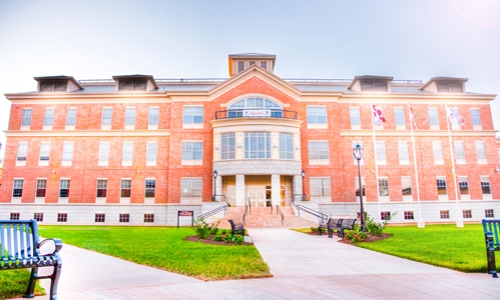This news release is more than 14 years old. Program information may no longer be accurate, and links may not work. For current program information, please refer to the program section.

The following has been released by Industry Canada
Blending the old with the new is a challenge for any new construction in an established area. In the case of Holland College in Charlottetown, Prince Edward Island, its new Centre for Applied Science and Technology building is a great example of how to mix old style with new technology.
Part of the college's Prince of Wales Campus Renewal project, the new centre boasts a lower level and three floors that together add 55,300 square feet of new classrooms and labs to the Holland College campus. The building features the latest in energy efficiency systems and will itself serve as a lab for students studying these technologies.
High tech and energy efficiency do not come at the expense of aesthetics, however, says Brian McMillan, President of Holland College. "It's quite a handsome building and I get at least 10 comments a month on how beautiful it is," he states. "It was built on what used to be a parking lot and some old houses, at the eastern entrance to Charlottetown. We decided to design the building to match the architectural integrity of the rest of campus and now it has not only added beautifully to our campus but also helped transform the entrance to our city and revitalize this older section of our historic community."
Behind the architecture lies a unique infrastructure built on renewable energy and sustainability, with 95 percent of the building's heating and cooling functions powered by solar and geothermal sources. "We have more than 20 geothermal wells, so the building can demonstrate how geothermal heating and cooling works," explains Dr. McMillan. "We are also using solar panels on one wall and on the roof to heat the building and generate electricity." The rooftop solar panels will share space with plants to make the entire roof "green," and large holding tanks are in place to catch and recycle rainwater for use in the washrooms.
"The Centre for Applied Science and Technology also has an integrated internal control system," he continues. "All our energy sources can communicate with each other. The heating, ventilating and cooling systems in this building are computerized and CO2 is tracked in each room so that the oxygen increases as you need it. The temperature and air quality is consistently controlled, making this a very smart, healthy building."
The building also allows Holland College to accommodate more students. "The waiting list to get into our programs has been a challenge," admits Dr. McMillan. "We had to turn away 800 qualified students last September. Thanks to this new building, we'll be able to accept approximately 280 more students annually in some key areas like health sciences, bioscience, and renewable and environmental technologies. We could only accept new students every second year in three of these programs but with this expansion we can now double our intake."
This is an important factor because the college trains students for strategic industries in the province. "The bioscience technology sector is significant on P.E.I. and a priority nationally," he explains. "Holland College provides all the lab technicians for this sector and we've launched some exciting new programs as well that address important industries in our society."
One of those is the new two-year energy systems engineering technology program, which teaches tradespeople about adapting renewable energy technologies in construction. Students learn about energy systems such as geothermal and solar, minimizing operating costs, implementing recycling systems for rainwater, and many other efficiencies and systems. The college has also launched a heritage retrofit program that centres on how to use new technologies when restoring older buildings.
"There is a high demand for the skills students will acquire from these new programs," states Dr. McMillan. "As well, the centre will actually be used as a laboratory; students will be able to assess how these kinds of systems work in the very building where they're being trained."
The entire Centre for Applied Science and Technology project cost $17 million, with half of the funding coming from the Government of Canada's Knowledge Infrastructure Program (KIP) under Canada's Economic Action Plan and the remainder from the Province of Prince Edward Island's Department of Innovation and Advanced Learning.
"KIP has had a profound impact by helping us respond to a significant wait list and accommodate more programs," says Dr. McMillan. "And this project has become a catalyst to realizing the rest of our vision and college expansion. The Prince of Wales Campus redevelopment project also included the construction of the Centre for Community Engagement and an expansion of Glendenning Hall, the college's residence, doubling its capacity."
He also notes that the project has become an economic driver for surrounding businesses. "It has revitalized this part of the city. Now we're looking at opening up these new facilities in the evening for part-time students, the public and local industries to use. We want our community outreach to extend beyond five days a week, nine to five."
For more information about this release, please contact:
Michelle Gallant, Media and Communications Officer
Tel: 902-629-4270
Date: Wednesday, November 09, 2011